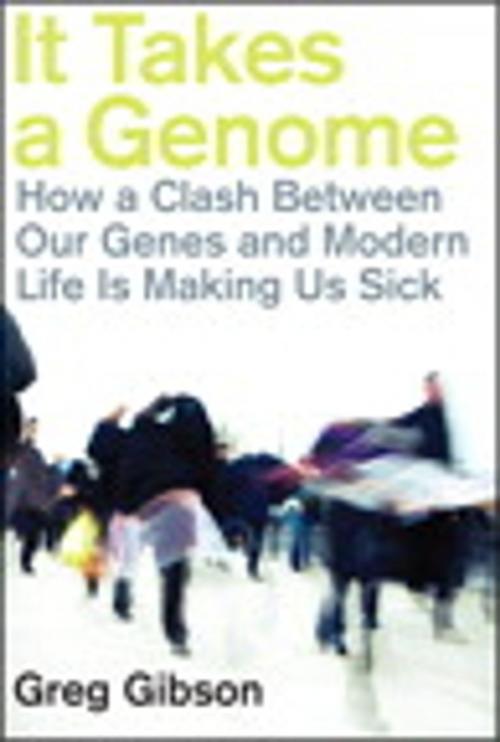It Takes a Genome
How a Clash Between Our Genes and Modern Life is Making Us Sick
Nonfiction, Health & Well Being, Medical, Medical Science, Genetics, Science & Nature, Science, Biological Sciences, Biology| Author: | Greg Gibson | ISBN: | 9780132704212 |
| Publisher: | Pearson Education | Publication: | December 24, 2008 |
| Imprint: | FT Press | Language: | English |
| Author: | Greg Gibson |
| ISBN: | 9780132704212 |
| Publisher: | Pearson Education |
| Publication: | December 24, 2008 |
| Imprint: | FT Press |
| Language: | English |
Human beings have astonishing genetic vulnerabilities. More than half of us will die from complex diseases that trace directly to those vulnerabilities, and the modern world we’ve created places us at unprecedented risk from them*. In It Takes a Genome*, Greg Gibson posits a revolutionary new hypothesis: Our genome is out of equilibrium, both with itself and its environment. Simply put, our genes aren’t coping well with modern culture. Our bodies were never designed to subsist on fat and sugary foods; our immune systems weren’t designed for today’s clean, bland environments; our minds weren’t designed to process hard-edged, artificial electronic inputs from dawn ‘til midnight. And that’s why so many of us suffer from chronic diseases that barely touched our ancestors.
Gibson begins by revealing the stunningly complex ways in which multiple genes cooperate and interact to shape our bodies and influence our behaviors. Then, drawing on the very latest science, he explains the genetic “mismatches” that increasingly lead to cancer, diabetes, inflammatory and infectious diseases, AIDS, depression, and senility. He concludes with a look at the probable genetic variations in human psychology, sharing the evidence that traits like introversion and agreeableness are grounded in equally complex genetic interactions.
It Takes A Genome demolishes yesterday’s stale debates over “nature vs. nurture,” introducing a new view that is far more intriguing, and far closer to the truth.
- See how broken genes cause cancer
Meet the body’s “genetic repairmen”—and understand what happens when they fail - The growing price of the modern lifestyle
Why one-third of all Westerners have obesity, Type 2 diabetes, or other signs of “metabolic syndrome” - The Alzheimer’s generation
Why some of us are predisposed to dementia - What’s really normal: the deepest lessons of the human genome
The remarkable diversity of physical and emotional “normality”
Human beings have astonishing genetic vulnerabilities. More than half of us will die from complex diseases that trace directly to those vulnerabilities, and the modern world we’ve created places us at unprecedented risk from them*. In It Takes a Genome*, Greg Gibson posits a revolutionary new hypothesis: Our genome is out of equilibrium, both with itself and its environment. Simply put, our genes aren’t coping well with modern culture. Our bodies were never designed to subsist on fat and sugary foods; our immune systems weren’t designed for today’s clean, bland environments; our minds weren’t designed to process hard-edged, artificial electronic inputs from dawn ‘til midnight. And that’s why so many of us suffer from chronic diseases that barely touched our ancestors.
Gibson begins by revealing the stunningly complex ways in which multiple genes cooperate and interact to shape our bodies and influence our behaviors. Then, drawing on the very latest science, he explains the genetic “mismatches” that increasingly lead to cancer, diabetes, inflammatory and infectious diseases, AIDS, depression, and senility. He concludes with a look at the probable genetic variations in human psychology, sharing the evidence that traits like introversion and agreeableness are grounded in equally complex genetic interactions.
It Takes A Genome demolishes yesterday’s stale debates over “nature vs. nurture,” introducing a new view that is far more intriguing, and far closer to the truth.
- See how broken genes cause cancer
Meet the body’s “genetic repairmen”—and understand what happens when they fail - The growing price of the modern lifestyle
Why one-third of all Westerners have obesity, Type 2 diabetes, or other signs of “metabolic syndrome” - The Alzheimer’s generation
Why some of us are predisposed to dementia - What’s really normal: the deepest lessons of the human genome
The remarkable diversity of physical and emotional “normality”















